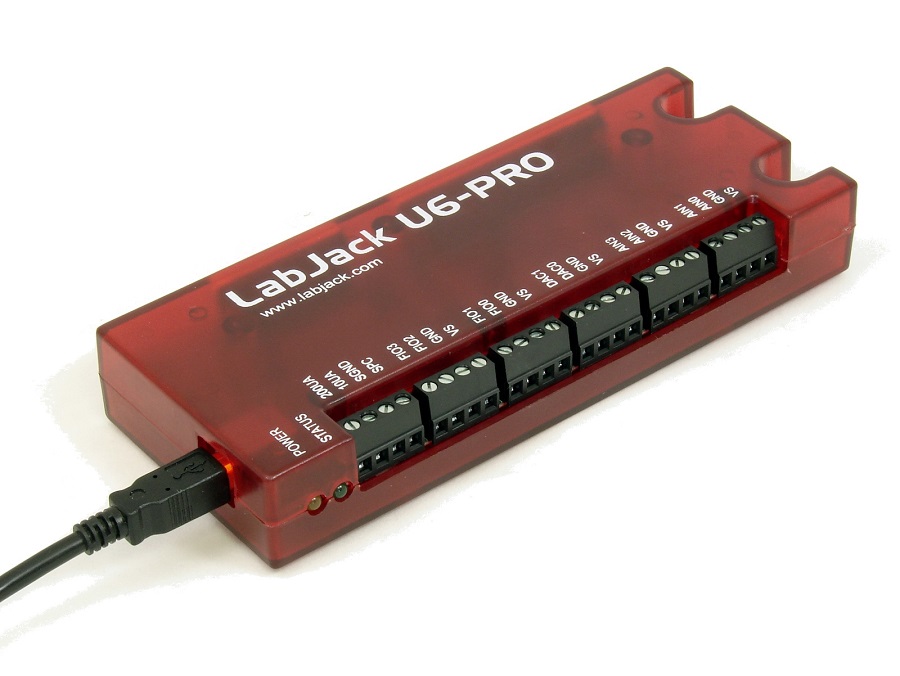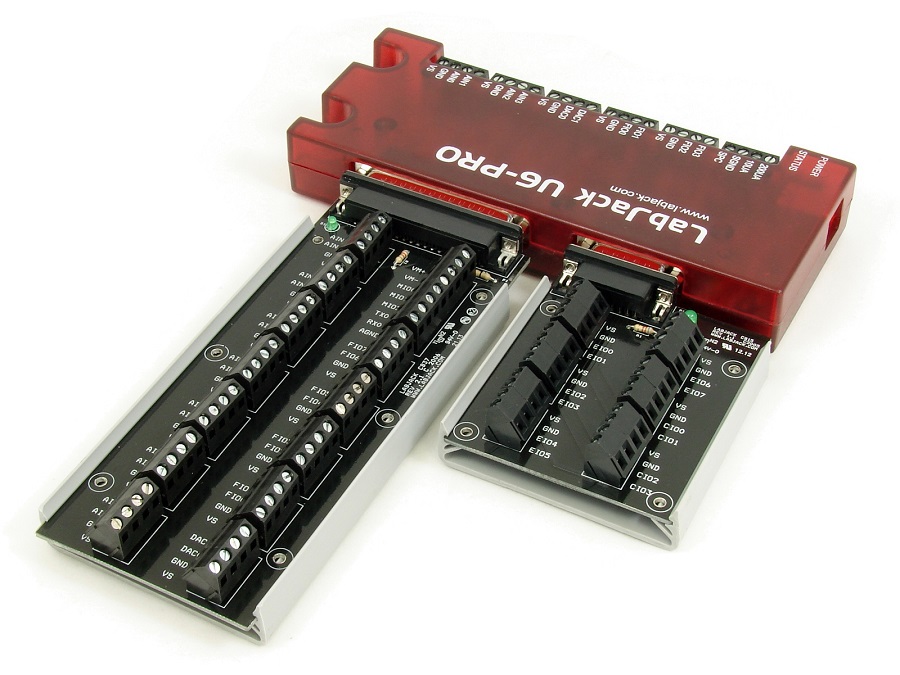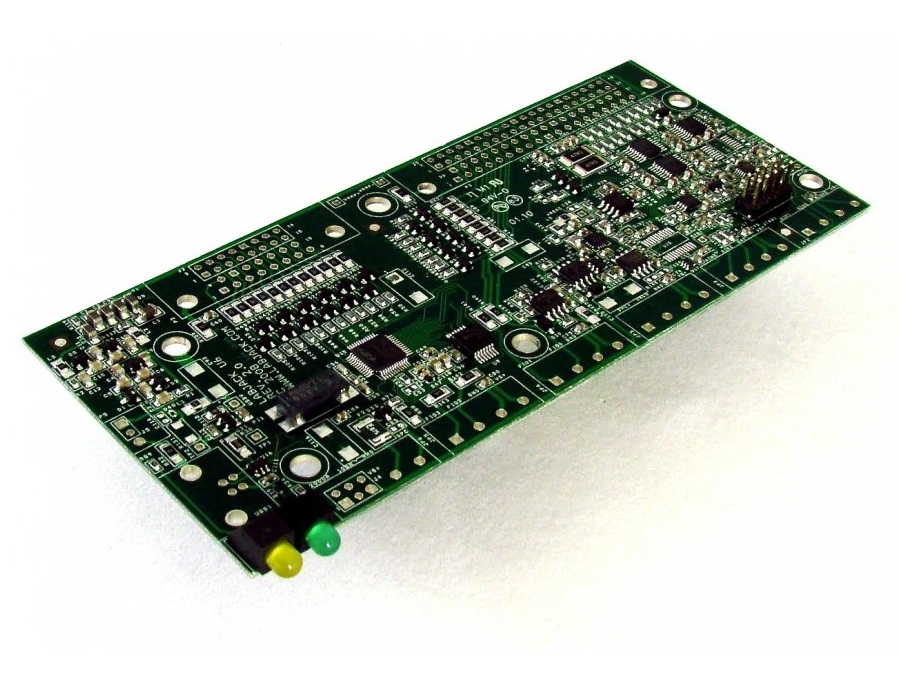USB multifunction DAQ device with 14 analog inputs (16- to 18- bit), 2 analog outputs (12-bit), 20 digital I/O, 2 counters, and 4 timers.
USB Multifunction DAQ
The U6 family is great for acquiring signals from thermocouples, strain gages, bridge circuits, encoders, and much more. With instrumentation amplified inputs, and software selectable gain settings, the U6 provides a cost effective method to measure analog signals which can’t be resolved by traditional 12-bit DAQ products. Common applications include laboratory research, industrial control and monitoring, and prototype development.
The U6-Pro offers the addition of a 24-bit low-speed ADC for applications with higher resolution requirements.
USB Multifunction DAQ
The U6 family is great for acquiring signals from thermocouples, strain gages, bridge circuits, encoders, and much more. With instrumentation amplified inputs, and software selectable gain settings, the U6 provides a cost effective method to measure analog signals which can’t be resolved by traditional 12-bit DAQ products. Common applications include laboratory research, industrial control and monitoring, and prototype development.
The -OEM variant does not include the screw terminals or enclosure. Designed for direct integration into a larger product, or platform.
USB Multifunction DAQ
The U6 family is great for acquiring signals from thermocouples, strain gages, bridge circuits, encoders, and much more. With instrumentation amplified inputs, and software selectable gain settings, the U6 provides a cost effective method to measure analog signals which can’t be resolved by traditional 12-bit DAQ products. Common applications include laboratory research, industrial control and monitoring, and prototype development.
The -OEM variant does not include the screw terminals or enclosure. Designed for direct integration into a larger product or platform.
USB Multifunction DAQ
The U6 family is great for acquiring signals from thermocouples, strain gages, bridge circuits, encoders, and much more. With instrumentation amplified inputs, and software selectable gain settings, the U6 provides a cost effective method to measure analog signals which can’t be resolved by traditional 12-bit DAQ products. Common applications include laboratory research, industrial control and monitoring, and prototype development.
Analog Inputs:
The LabJack U6 has 14 external analog inputs (AIN0-AIN13). AIN0-AIN3 are available on screw terminals and also on the DB37 connector. All 14 analog inputs are available on the DB37 connector.
The maximum input range is ±10 volts, with software selectable gains of x1, x10, and x100. Each analog input can be measured single-ended, or differentially in even/odd pairs. Analog input resolution is 16 bits at max speed (~20 μs conversion time), increasing to 18+ bits at slower speeds (see Section 3.1 – Command/Response and Section 3.2 – Stream Mode). Input impedance is at least 1 GΩ, with typical input bias currents of only 20 nA.
Command/response (software timed) analog input reads typically take 1-4 ms depending on number of channels and communication configuration. Hardware timed input streaming (supported with hi-speed converter only) has a maximum rate that varies with resolution from 4 ksamples/s at 18 bits to 50 ksamples/s at 16 bits.
For more information see the U6 Datasheet. The U6-Pro has all the features of the normal U6 with the addition of an auxiliary low-speed high-resolution (24-bit) sigma-delta ADC. Analog input resolution varies from 19.5 bits (RMS or Effective) at max speed (4 ms conversion time), to 22 bits at slower speeds (160 ms conversion time).
For more information about the analog inputs see Section 2.6 – AIN and Appendix A. For data rate information see Section 3.1 – Command/Response and Section 3.2 – Stream Mode.
Temperature Sensor:
The LabJack U6 has a temperature sensor located very close to the AIN0-AIN3 screw-terminals. Accuracy is ±2 degrees C (max). This sensor is particularly useful for thermocouple cold junction compensation (CJC).
Fixed Current Outputs:
The LabJack U6 has 2 fixed current outputs of 10 μA and 200 μA. These are useful for measuring resistance (resistors, thermistors, RTDs).
Analog Outputs:
The LabJack U6 has 2 analog outputs (DAC0 and DAC1) that are available both on screw terminals and the DB37 connector. Each analog output can be set to a voltage between about 0 and 5 volts with 12-bits of resolution. The analog outputs are based on a true voltage reference.
The analog outputs are updated in command/response mode, with a typical update time of 1-4 ms depending on communication configuration.
For more information see the U6 Datasheet. For more information about the analog outputs see Section 2.7 – DAC and Appendix A. For data rate information see Section 3.1 – Command/Response.
Digital I/O:
The LabJack U6 has 20 digital I/O channels which can be individually configured as input, output-high, or output-low.
The first 4 FIO are available on screw terminals and the DB37 connector. All 8 FIO and 3 MIO are available on the DB37 connector, and 8 EIO and 4 CIO are available on the DB15 connector. Note that on the U6, CIO0-CIO2 are the same as MIO0-MIO2.
Command/response (software timed) reads/writes typically take 1-4 ms depending on communication configuration. The digital inputs can also be read in a hardware timed input stream where up to 16 inputs count as a single stream channel.
For more information see the U6 Datasheet. For more information about the digital I/O see Section 2.8 – Digital I/O and Appendix A. For data rate information see Section 3.1 – Command/Response and Section 3.2 – Stream Mode.
Timers:
Up to 4 digital I/O can be configured as timers. The timers are very flexible, providing options such as PWM output, pulse timing, pulse counting, and quadrature input.
For more information about the timers see Section 2.9 – Timers/Counters and Appendix A of the U6 Datasheet.
Counters:
Up to 2 digital I/O can be configured as 32-bit counters. Since counting is one possible mode of the timers above, the U6 has up to 6 counting inputs.
For more information about the counters see Section 2.9 – Timers/Counters and Appendix A of the U6 Datasheet.
I/O Protection:
All I/O lines on the U6 are protected against minor overvoltages. The AIN lines can withstand continuous overvoltage of ±20 volts, the FIO lines can withstand up to ±10 volts, while the EIO/CIO/MIO lines can withstand up to ±6 volts.
High Channel Count Applications:
By using USB hubs, many LabJacks can be interfaced to a single PC, providing an inexpensive solution for high channel count applications.
Technical Specifications:
- 14 Analog Inputs (16-18+ Bits Depending on Speed)
- U6-Pro Adds 24-bit Low-Speed ADC for 22-Bit Effective Resolution
- Single-Ended Inputs (14) or Differential Inputs (7)
- Instrumentation Amplifier Inputs
- Software Programmable Gains of x1, x10, x100 and x1000
- Analog Input Ranges of ±10, ±1, ±0.1 and ±0.01 Volts
- Built-In CJC Temperature Sensor
- 2 Fixed Current Outputs (200/10 μA)
- 2 Analog Outputs (12-Bit, ~0-5 Volts)
- 20 Digital I/O
- Up to 2 Counters (32 Bits Each)
- Up to 4 Timers (Pulse Timing, PWM Output, Quadrature Input, …)
- Supports SPI, I2C, and Asynchronous Serial Protocols (Master Only)
- Supports Software or Hardware Timed Acquisition (Hi-Speed Converter Only)
- Maximum Input Stream Rate of 50 kHz (Depending on Resolution)
- Capable of Command/Response Times Less Than 1 Millisecond
- Built-In Screw Terminals for Some Signals
- USB 2.0/1.1 Full Speed Interface
- Powered by USB Cable
- Drivers Available for Windows, Linux and Mac.
- Examples Available for C/C++, VB, LabVIEW, Python, and More
- Includes USB Cable and Screwdriver
- Free Firmware Upgrades
- Money Back Guarantee
- Enclosure Size Approximately 3″ x 7″ x 1″ (75mm x 185mm x 30mm)
- Rated for Industrial Temperature Range (-40 to +85 Degrees C)
For more technical specifications look at the U6’s datasheet.
U6 vs U6-Pro
The U6-Pro has the following additional features:
- Low-Speed and High-Resolution (24-bit) sigma-delta ADC giving access to resolution indices 9 through 12.
OEM Versions
The U6 and U6-Pro come in standard and OEM versions. The OEM versions are intended to be embedded in another device. They are missing the enclosure and most connectors, as it is easier to install connectors than it is to remove them. LabJack can customize the boards to add or remove hardware before shipping for an additional fee. More information on OEM versions can be found in the OEM versions section of the U6 datasheet.
Optional Accessories:
The CB15 is a simple screw terminal breakout for the DB15 connector.
The CB37 (Rev. 2.1) is a simple screw terminal breakout for the DB37 connector.
The EB37 experiment board also provides screw terminals for the DB37 connector, and in addition provides a solderless breadboard and useful power supplies.
The RB12 provides a convenient interface for the U6 to industry standard digital I/O modules, allowing electricians, engineers, and other qualified individuals, to interface a LabJack with high voltages/currents. The RB12 relay board connects to the DB15 connector on the LabJack, using the 12 EIO/CIO lines to control up to 12 I/O modules. Output or input types of digital I/O modules can be used. The RB12 is designed to accept G4 series digital I/O modules from Opto22, and compatible modules from other manufacturers such as the G5 series from Grayhill. Output modules are available with voltage ratings up to 200 VDC or 280 VAC, and current ratings up to 3.5 amps.
The LJTick-Divider (LJTD) signal-conditioning module is designed to divide 2 single-ended higher voltage analog signals down to 0-2.5 volt signals.
The LJTick-DAC (LJTDAC) provides a pair of 14-bit analog outputs with a range of ±10 volts. Plugs into any digital I/O block, and thus up to 10 of these can be used per device to add 20 analog outputs.
The LJTick-InAmp (LJTIA) signal-conditioning module provides two instrumentation amplifiers ideal for low-level signals such as bridge circuits (e.g. strain gauges) and thermocouples. Each amplifier converts a differential input to single-ended.
The LJTick-RelayDriver (LJTRD) allows 2 digital I/O lines to each control a relay or other moderate load up to 50V/200mA.
The LJTick-CurrentShunt (LJTCS) signal-conditioning module is designed to convert a 4-20 mA current loop input signal into a 0.47-2.36 volt signal.
The LJTick-Proto (LJTP) consists of an 8×8 grid of holes for prototyping custom signal-conditioning modules.
Satisfaction Guaranteed
Everything we sell has a 30-day money back guarantee. If, for any reason, you are not satisfied with a product, contact us to arrange your choice of a refund or replacement. In addition, the LabJack U6 is covered by a 1-year limited warranty.
Technical Support
All LabJacks include lifetime technical support. Support resources include forum, FAQs, email, and telephone.
Drivers and Examples:
LabJack provides drivers for the three major operating systems, and examples for most common programming languages. For more information see the U6 software options page.
Firmware:
Be sure to keep an eye on the U6 Firmware page for the latest U6 firmware.
Package Contents (Non-OEM)
- U6 (-Pro) unit itself in red enclosure
- USB cable (6 ft / 1.8 m)
- Screwdriver
- Other package details: No software CD included. Download the software from labjack.com.
- Retail packing (Package) size: 10″ x 3.5″ x 3″
- Retail packing (Package) wt: 1 lb
LJTick-VRef
The LJTick-VRef is a Voltage reference accessory that outputs a stable 2.5V or 4.096V signal.
CB37 Terminal Board
Provides convenient screw terminals for the DB37 connector on the LabJack T7.
CB15 Terminal Board
Provides convenient screw terminals for the 12 digital I/O lines on the DB15 connector of compatible LabJack devices.
Mux80 AIN Expansion Board
Analog input expansion board that adds 80 analog input channels.
3ft DB37 M/F Serial Cable
A three foot DB37 cable, useful for connections between the Mux80 and CB37 Terminal Board(s).











